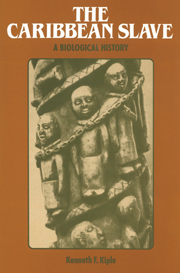Book contents
- Frontmatter
- Contents
- List of Tables
- Preface
- Acknowledgments
- Part I Background and Biology
- Part II Diet, Disease, and Demography
- Introduction
- 4 The Middle Passage and Malnutrition
- 5 Plantation Nutrition
- 6 Malnutrition: Morbidity and Mortality
- 7 Slave Demography
- 8 Slave Infant and Child Mortality
- 9 Black Diseases and White Medicine
- Part III Pathogens and Politics
- Notes
- Bibliographic Essay
- Index
4 - The Middle Passage and Malnutrition
Published online by Cambridge University Press: 19 October 2009
- Frontmatter
- Contents
- List of Tables
- Preface
- Acknowledgments
- Part I Background and Biology
- Part II Diet, Disease, and Demography
- Introduction
- 4 The Middle Passage and Malnutrition
- 5 Plantation Nutrition
- 6 Malnutrition: Morbidity and Mortality
- 7 Slave Demography
- 8 Slave Infant and Child Mortality
- 9 Black Diseases and White Medicine
- Part III Pathogens and Politics
- Notes
- Bibliographic Essay
- Index
Summary
…and it will still continue true, that never can so much misery be found condensed into so small a space as in a slave ship during the middle passage.
William Wilberforce (1807)I think it could be plausibly argued that changes of diet are more important than changes of dynasty or even of religion…yet it is curious how seldom the all-importance of food is recognized.
George Orwell (1937)The “scramble” was held soon after a slave ship entered port–the captain anxious to be rid of his cargo with its ever-present danger of revolt, particularly now that the slaves knew they were no longer at sea. But despite this anxiety blacks were first “made up” by experts among the crew; skins were rubbed with oil to make them shine, rum was administered to clear the eyes and brighten the countenance, sores were covered with iron rust and gunpowder, lesions closed, and even anuses corked to prevent the telltale leakage of the flux.
Thus, during the scramble, defects often escaped detection as prospective buyers rushed about claiming slaves. Only later might the owner discover that his new acquisitions were plagued with yaws or severe worm infestation or dysentery or all three. Yet the spectacle of the scramble, with all its haste and attendant financial risk highlighted the eagerness of West Indian planters for black slaves. They had become convinced that only the black man could labor and survive in warm climates.
- Type
- Chapter
- Information
- The Caribbean SlaveA Biological History, pp. 57 - 75Publisher: Cambridge University PressPrint publication year: 1985



